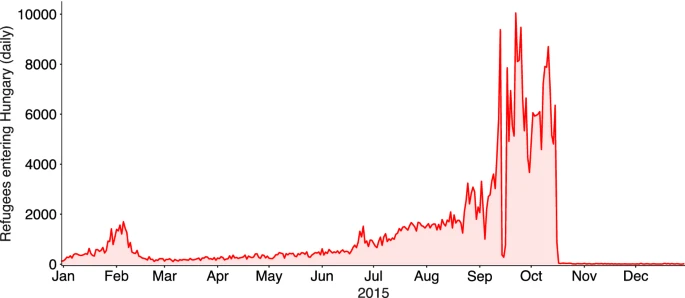New journal article, co-authored by Gergő Tóth, researcher of the Economics of Networks working group
02/10/2021 | 11:56No Country for Asylum Seekers? How Short-Term Exposure to Refugees Influences Attitudes and Voting Behavior in Hungary
Theresa Gessler, Gergő Tóth & Johannes Wachs
Abstract
| Number of refugees entering Hungary daily in 2015. The Serbian border was sealed on September 18th, causing a brief, sharp decrease in entries. The Croatian border was sealed on October 17th, practically ending the inflow of refugees to Hungary. Source: police.hu - Border information |
How does exposure to refugees influence political behavior? We present evidence from Hungary, a country with widespread anti-immigration attitudes, that short term exposure during the 2015 refugee crisis predicts anti-refugee voting and sentiment. We code exposure to refugees at the settlement level using reports from state media, an independent online news site, and an online social media aggregator. Settlements through which refugees traveled showed significantly higher anti-refugee voting in a national referendum in 2016. The effect decreases sharply with distance. Using a difference-in-differences model, we find that the far-right opposition gained, while the governing right-wing party lost votes in these settlements in subsequent parliamentary elections. This suggests incumbents are punished by voters skeptical of immigration regardless of their policy position. Survey data supports this finding of a competition among right-wing parties, as individuals in exposed settlements are more fearful of immigrants and support restrictive policies only if they identify as right-wing.
Events
Featured news
New study by Ágnes Óvári and co-authors in Waste Management scientific journal
 This study focuses on a comprehensive sustainability assessment of the management of the organic fraction of municipal solid waste in Ghent (Belgium), Hamburg (Germany) and Pécs (Hungary). A sustainability assessment framework has been applied to analyse social, environmental, and economic consequences at the midpoint level (25 impact categories) and at the endpoint level (5 areas-of-protection).
This study focuses on a comprehensive sustainability assessment of the management of the organic fraction of municipal solid waste in Ghent (Belgium), Hamburg (Germany) and Pécs (Hungary). A sustainability assessment framework has been applied to analyse social, environmental, and economic consequences at the midpoint level (25 impact categories) and at the endpoint level (5 areas-of-protection).
- 07/29/2021
- Read more
Book chapter by Ágnes Szunomár and Tamás Peragovics in Western Balkans Playbook - Competition for influence among foreign actors
 Edited by: Gergely Varga and Tamás Levente Molnár
Published by the Institute for Foreign Affairs and Trade (Budapest, 2021)
Edited by: Gergely Varga and Tamás Levente Molnár
Published by the Institute for Foreign Affairs and Trade (Budapest, 2021)
- 07/26/2021
- Read more
Conference presentations by Zoltán Bakucs, Lajos Baráth, Zsófia Benedek and Imre Fertő on the 16th Congress of the European Association of Agricultural Economists
 After its postponement due to the Covid-19 crisis, the Congress took place 20-23 July 2021 in an online format.
The theme was: Raising the Impact of Agricultural Economics: Multidisciplinarity, Stakeholder Engagement and Novel Approaches
After its postponement due to the Covid-19 crisis, the Congress took place 20-23 July 2021 in an online format.
The theme was: Raising the Impact of Agricultural Economics: Multidisciplinarity, Stakeholder Engagement and Novel Approaches
- 07/26/2021
- Read more


